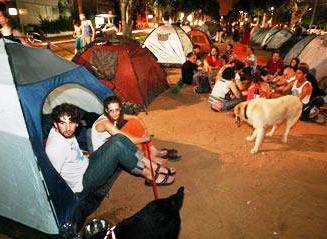It isn’t Bibi - it's the system, stupid
08/18/2011 14:11 By ALON PINKAS
Photo by: Marc Israel Sellem
RELATED:
Welfare states and socialism are about as dead as Elvis
You would think that 2000 years of exposure to all conceivable political systems would prepare Jews for the day they regain independence and reclaim sovereignty.
You'd be wrong.
You might also be tempted to think that Jews had drawn lessons from life under the Catholic Church, Turkish Sultanate, England’s Glorious Revolution, the French Revolution, the American Revolution, the Spring of Nations, the Bolshevik Revolution, and a host of other garden-variety systems like fascism, monarchies and totalitarianism.
You would expect Jewish political thinkers, Zionist leaders and the founding fathers of the State of Israel to have come up with the Ten Commandments of a modern, functioning, governability-enabling electoral system.
That Israel is a democracy - and a vibrant one at that, is not to be taken for granted. After all, the Zionists responsible for converting the dream of Zionism into political praxis came from patently non-democratic European societies.
These zealous Zionists then set to bring home their long lost brothers and sisters from Arab countries - again, not exactly bastions of free constitutional republics. In this respect Israel is perhaps an "illiberal democracy," but a democracy nonetheless.
Yet Israel’s democratic origins were shaped by mitigating circumstances from within and without: The confluence of the pre-state Yishuv political institutions and political schisms, the impending end of the British Mandate, and the threat of war lurking ominously on the horizon. This resulted in an urgency to quickly construct a working political model.
So the inherently heterogeneous Israel of circa 1948 (exponentially more heterogeneous in 2011) gave birth to a mutant electoral system, or what political scientists fondly refer to as "proportional representation." It is a rare, unique and peculiar system.
It is, in essence, the only functioning dysfunctional system known to mankind. At least, that is, to your average homo democraticus. It kind of works, but not really. It represents, but not exactly. It is a distortion, but at least it reflects a real mosaic. It makes governability impossible and paralyzes decision-making, but then so too—if not more so—the American system.
Prime Minister Binyamin Netanyahu is Israel’s premier by virtue of 24% of the popular vote. That would be impossible in, say, Britain, Germany, Canada and other parliamentary democracies with different electoral systems. Mr. Netanyahu is where he is fair and square. Although he didn’t strictly "win" the 2009 elections, he also did not usurp power. Constitutionally he holds all the powers of a prime minister and until recently was judged by commentators to be a stable (whatever that means) leader.
Yet at the same time, he has no real mandate to do anything autonomously. What he does have—as with many of his predecessors—is a binding, paralyzing and ever-threatening coalition.
Purists in Israel are often heard making the following claim: Stop grumbling about the political system because any other would be unrepresentative and divisive. This country is essentially divided into 6 or 7 tribes with irreconcilable differences; it is heterogeneous beyond a common narrative that is above the lowest common denominator; it is sectorial and sub-sectorial in a way that defies definition. We are still nation-building. Thus, the coalition acts as an adhesive between Israel’s disparate factions and implementing electoral changes would be an exercise in futility at best. In fact, say these proponents, there is no better system that can truly prevent exclusion or resentment while capturing the country’s diversity. As such, in any other systems, the lack of representation would mean that major policies and decisions would be rendered illegitimate.
This attitude may be conducive to countries like Canada, Denmark, Uruguay, Italy, Thailand or anywhere else that doesn't require the decisions that an Israeli government needs to make.
Diversity is not a synonym for dysfunctional politics and heterogeneity should not be an excuse for governance paralysis. For these coalition-condoners, preserving the current model has become the prime objective. Yet they fail to realize that by its very nature, it is a system that nurtures inaction which in turn breeds incompetence; perpetuating politics as nothing more than a reality game of survival.
Keeping this in mind, if we steer the discourse towards the ongoing protest movement the only logical advice to the prime minister is not to change his policies. Netanyahu was not elected as a proponent of the welfare state. Neither is he a social-democrat. Rather, he is more akin to a Thatcherite/Republican conservative who believes in the infinite wisdom of the market and small government.
Netanyahu thinks that redistributive policy and government is a travesty, and that social justice can only be determined by solid economic life and not by legislation or intervention through policy. He never concealed his disdain with the idea of Palestinian statehood and neither does he truly believe in the feasibility of the two-state model.
So why are his detractors still trying to force the leopard prime minister to change his spots? Quite simply, they are in denial about Netanyahu’s real source of power: The system itself.
Consider that 76% of Israelis did not actually vote for Mr. Netanyahu in the 2009 elections! And yet despite this, the system itself—our country’s expression of its bountiful heterogeneity—catapulted him to the very top.
So stop asking Netanyahu to transmogrify into something he never was. You want to change priorities? You demand social justice? You want what you think is a peace process? Then change the system.
The writer is a diplomat who recently served as consul-general in New York.







 Police officers were being deployed to respond to "copycat criminal activity" across the city.
Police officers were being deployed to respond to "copycat criminal activity" across the city.








 Sunday, August 7, 2011 at 10:32AM
Sunday, August 7, 2011 at 10:32AM
